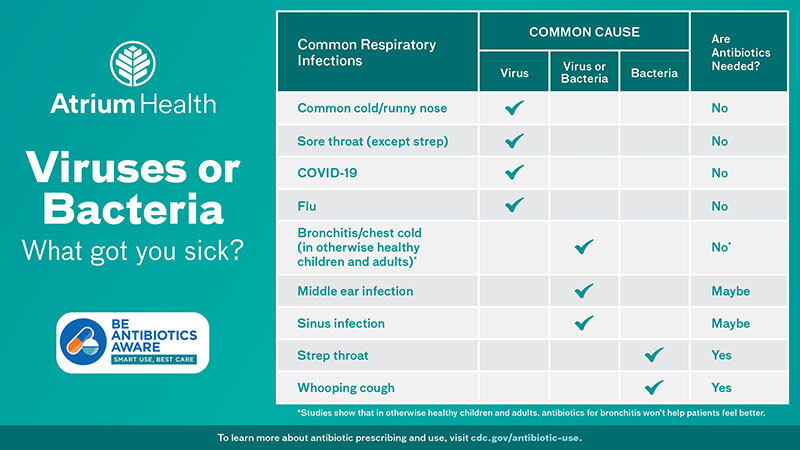Antibiotics are most likely not what you need. Colds, sore throats and bronchitis are actually caused by viruses and not bacteria. In these cases, your doctor may “prescribe” rest, plenty of fluids or other symptom-fighters instead.
“Antibiotics don’t treat viruses and can actually be harmful if not taken appropriately,” says Dr. Lisa Davidson, medical director for antimicrobial stewardship at Atrium Health Infectious Disease Kenilworth.
Be Antibiotics Aware is a national effort led by the Centers for Disease Control and Prevention to fight antibiotic resistance and improve antibiotic prescribing and use. The CDC is working to make sure prescribers use the right antibiotic, at the right dose, for the right duration and at the right time. Improving the way antibiotics are prescribed and used, or “antibiotic stewardship,” is critical to effectively treat infections, combat antibiotic resistance and protect patients from the harm that can come from using an antibiotic when you don’t really need one.
It’s Cold Outside!
During cold and flu season, acute respiratory tract infections are the most common reason adults ask their doctors for antibiotics. But you don’t actually need an antibiotic for things like a sore throat, uncomplicated bronchitis, pharyngitis (inflammation of the pharynx that causes discomfort, scratchiness, pain and difficulty in swallowing), sinus infections or the common cold. Taking antibiotics for viral infections like the flu or COVID-19 will not cure the infection, keep other people from getting sick or help you or your child feel better. They may even cause unnecessary and harmful side effects and contribute to antibiotic resistance. That’s when bacteria resists the effects of an antibiotic and it could actually hurt you.
“Overuse of antibiotics contributes to the spread of antibiotic resistance, can cause serious adverse effects including allergic reactions and is responsible for one out of every five ER visits," says Davidson. “Patients often want to see their health care provider when upper respiratory symptoms are not improving quickly. Many people assume that an antibiotic will help. Instead of asking their doctor for an antibiotic, patients and doctors should discuss over-the-counter remedies that could help soothe their symptoms and avoid harmful side effects of antibiotics.”
Before you ask for an antibiotic, see the Centers for Disease Control and Prevention see antibiotics do and don’ts and treatment for common illnesses.
Atrium Health is nationally recognized for the work being done with our providers, our practices and our patients on appropriate education for what antibiotics should and shouldn't be used. Learn more about antibiotic use and patient education in this video interview with Davidson.
You can also learn more at the Centers for Disease Control and Prevention antibiotic use questions and answers.

Atrium Health Infectious Disease Kenilworth is a referral-based practice, meaning your primary care doctor or specialist will recommend and refer you to our doctors.



